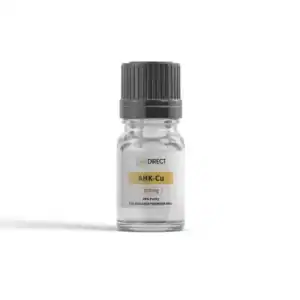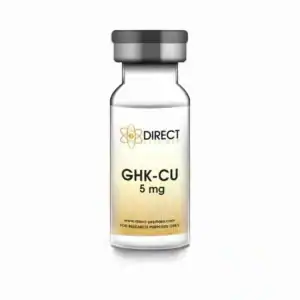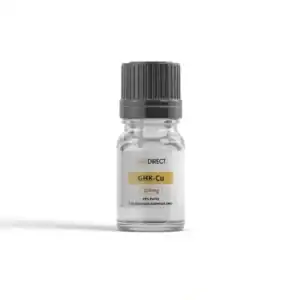Peptides have become an essential topic in research, especially when it comes to their potential in regenerative medicine, skincare, and hair restoration. Among the various peptides that have caught the attention of the research community, AHK-Cu and GHK-Cu are two of the most discussed.
While both are copper peptides, they have different molecular structures and applications that may influence their role in various therapeutic areas. But what truly sets AHK-Cu vs GHK-Cu apart? Do they offer distinct benefits, or are they simply two sides of the same coin?
To answer this question, we must explore the molecular structure, research applications, and potential uses of both peptides. Understanding the differences and similarities between AHK-Cu and GHK-Cu can help researchers determine the best peptide for specific research purposes, whether in hair restoration, wound healing, or skin regeneration.
At the heart of the discussion about AHK-Cu vs GHK-Cu lies their molecular structures. Although both peptides are copper-bound, they differ significantly in the way their amino acid sequences are arranged. AHK-Cu is a tetrapeptide consisting of four amino acids, while GHK-Cu is a tripeptide made up of three amino acids.
These differences in structure lead to varying biological effects. AHK-Cu has shown promising results in targeted hair restoration research by binding to specific receptors in hair follicles, stimulating growth, and reducing hair loss.
On the other hand, GHK-Cu, with its broader range of regenerative properties, is often seen as more versatile in its application for skin repair, wound healing, and collagen production.
The comparison between AHK-Cu vs GHK-Cu ultimately comes down to your research focus: Are you primarily interested in hair restoration, or are you exploring more general regenerative and anti-aging applications?
Explore AHK-Cu Peptide from Direct Peptides New Zealand, a copper peptide known for its potential to stimulate hair growth and improve scalp health.
 Building on the molecular differences, AHK-Cu is particularly effective in the realm of hair restoration. This peptide works by binding to specific receptors in hair follicles, activating growth factors that extend the anagen (growth) phase of hair.
Building on the molecular differences, AHK-Cu is particularly effective in the realm of hair restoration. This peptide works by binding to specific receptors in hair follicles, activating growth factors that extend the anagen (growth) phase of hair.
By stimulating these receptors, AHK-Cu is thought to promote hair thickness and reduce shedding, making it a popular peptide for researchers exploring potential treatments for hair loss.
Moreover, AHK-Cu can enhance blood circulation in the scalp, fostering a healthier environment for hair follicles to thrive. This mechanism may help restore scalp health and overall hair vitality, making AHK-Cu the peptide of choice for targeted hair restoration studies.
Explore Peptide Supplies at Direct Peptides New Zealand for all your reconstitution requirements.
While AHK-Cu is highly effective for promoting hair growth, GHK-Cu is considered a more versatile peptide due to its broader range of applications in regenerative medicine. GHK-Cu has been shown to aid in wound healing, skin regeneration, and inflammation reduction.
Unlike AHK-Cu, which has a more focused use in hair restoration, GHK-Cu is studied for its ability to promote tissue repair and collagen synthesis, playing a vital role in skin regeneration.
In New Zealand research, GHK-Cu has also been found to stimulate the production of glycosaminoglycans, essential for tissue hydration and skin elasticity. This peptide is used to explore how it can help heal wounds, improve skin quality, and even reduce the signs of aging.
Discover GHK-Cu from Direct Peptides New Zealand, a powerful copper peptide that supports skin regeneration, collagen synthesis, and wound healing.
 In the context of GHK-Cu, one of its most celebrated benefits is its role in collagen synthesis. Collagen is the structural protein that provides skin with strength and elasticity, and it declines with age, leading to wrinkles and sagging.
In the context of GHK-Cu, one of its most celebrated benefits is its role in collagen synthesis. Collagen is the structural protein that provides skin with strength and elasticity, and it declines with age, leading to wrinkles and sagging.
GHK-Cu has been studied for its ability to stimulate fibroblasts (the cells responsible for collagen production), thereby improving the skin’s firmness, reducing wrinkles, and enhancing overall skin health.
New Zealand Researchers have demonstrated that GHK-Cu promotes the production of new collagen, restores skin elasticity, and accelerates tissue repair. These properties make it a popular peptide in the anti-aging and skincare research sectors.
Building upon its collagen-stimulating properties, GHK-Cu is widely used in studies on wound healing. When the skin or tissues are injured, GHK-Cu plays a significant role in accelerating the healing process by promoting the formation of new blood vessels (angiogenesis) and increasing the activity of fibroblasts in the injured area. This peptide has shown promise in healing both acute and chronic wounds by facilitating faster tissue regeneration.
GHK-Cu’s ability to speed up healing and enhance tissue regeneration makes it an essential focus for researchers working in regenerative medicine, especially in areas involving skin damage, scarring, and recovery from injuries.
With the molecular differences and applications of AHK-Cu and GHK-Cu now clearly outlined, you may be wondering which peptide is better suited for your research focus.
If your primary research goal involves hair restoration and improving scalp health, AHK-Cu is the peptide of choice due to its targeted action on hair follicles.
However, if your research revolves around skin regeneration, wound healing, or anti-aging applications, GHK-Cu would be a more versatile option, as it can address a wider array of regenerative needs.
Both peptides have their unique advantages, and the choice ultimately depends on the specific areas of focus within your research.
 As with any experimental substance, it is critical to understand the safety profile of AHK-Cu vs GHK-Cu. Both peptides have been widely studied in controlled laboratory settings and are considered safe when used according to research guidelines.
As with any experimental substance, it is critical to understand the safety profile of AHK-Cu vs GHK-Cu. Both peptides have been widely studied in controlled laboratory settings and are considered safe when used according to research guidelines.
However, outside of these controlled environments, there is a need for continued research and clinical trials to determine their safety for broader applications.
It is important to note that these peptides are primarily for research purposes only and should be used under the supervision of qualified professionals in regulated environments. Their applications outside of research settings remain limited until further studies and trials confirm their safety and efficacy.
The difference between AHK-Cu vs GHK-Cu lies primarily in their molecular structures and specific research applications. AHK-Cu is particularly suited for hair restoration and scalp health, while GHK-Cu excels in broader tissue regeneration, wound healing, and anti-aging studies.
For researchers, choosing between the two peptides should be based on the specific goals of the project. Both peptides have proven effective in their respective domains, but their potential benefits for human health remain a subject of ongoing investigation.
[1] Pyo HK, Yoo HG, Won CH, Lee SH, Kang YJ, Eun HC, Cho KH, Kim KH. The effect of tripeptide-copper complex on human hair growth in vitro. Arch Pharm Res. 2007 Jul;30(7):834-9.
[2] Sadgrove NJ, Simmonds MSJ. Topical and nutricosmetic products for healthy hair and dermal antiaging using “dual-acting” (2 for 1) plant-based peptides, hormones, and cannabinoids. FASEB Bioadv. 2021 Jun 6;3(8):601-610.
[3] Pickart L, Margolina A. Regenerative and Protective Actions of the GHK-Cu Peptide in the Light of the New Gene Data. Int J Mol Sci. 2018 Jul 7;19(7):1987.
[4] Pickart L, Vasquez-Soltero JM, Margolina A. GHK Peptide as a Natural Modulator of Multiple Cellular Pathways in Skin Regeneration. Biomed Res Int. 2015;2015:648108.
Shop ALL Topical Peptides from Direct Peptides New Zealand today, your trusted supplier of premium clinical grade peptides online.
AHK-Cu is often described as more targeted for hair-related research because it interacts closely with hair follicle signaling pathways. GHK-Cu supports broader regenerative activity rather than focused hair follicle stimulation. Instead of being stronger, AHK-Cu is more specific in scope, while GHK-Cu supports wider biological repair processes.
AHK-Cu and GHK-Cu do not work the same way. Both bind copper, but they influence different biological pathways. AHK-Cu mainly affects hair follicle activity and growth signaling. GHK-Cu supports collagen production, tissue repair and the regulation of inflammation. Their shared copper binding leads to different functional outcomes.
GHK-Cu may support hair health indirectly by improving tissue repair and the follicle environment. However, it does not show the same targeted hair follicle activity as AHK Cu. AHK-Cu remains more specific to hair growth research, while GHK-Cu is studied more for skin regeneration, and general tissue repair.
Copper peptides mainly support tissue repair and follicle health rather than hair color. While copper plays a role in pigment related processes, research does not clearly show that copper peptides maintain hair color or prevent greying. Their primary focus remains regeneration, structural support, and overall follicle function rather than pigmentation control.
GHK-Cu is considered more versatile because it supports multiple regenerative processes. These include collagen synthesis, wound repair, angiogenesis and the control of inflammation across different tissues. AHK-Cu shows a narrower focus on hair follicle activity. This wider range of biological actions gives GHK Cu broader research applications.
ALL CONTENT AND PRODUCT INFORMATION AVAILABLE ON THIS WEBSITE IS FOR EDUCATIONAL PURPOSES ONLY.
DISCLAIMER: These products are intended solely as a research chemical only. This classification allows for their use only for research development and laboratory studies. The information available on our New Zealand Direct Peptides website: https://direct-peptides.com is provided for educational purposes only. These products are not for human or animal use or consumption in any manner. Handling of these products should be limited to suitably qualified professionals. They are not to be classified as a drug, food, cosmetic, or medicinal product and must not be mislabelled or used as such.